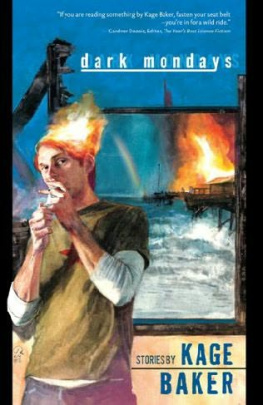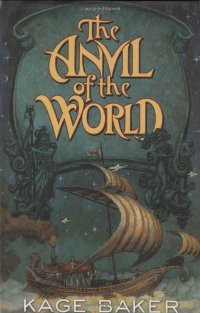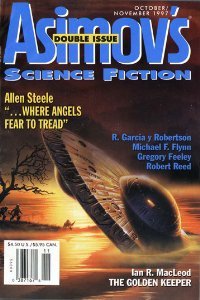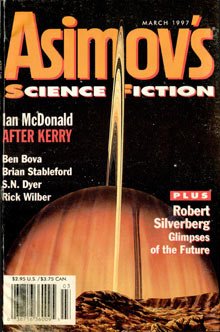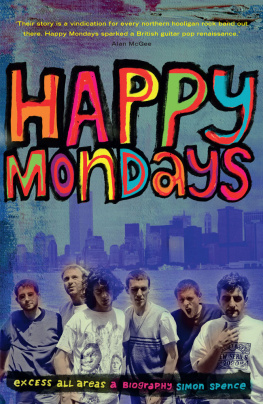Annotation
Kage Baker, celebrated creator of the Company novels and the standout collection Mother Aegypt now brings together pirates, primates, eldritch horrors, maritime ghosts, and much more in Dark Mondays. This captivating new collection of fantastic short fiction is sure to cement her reputation as one of the most original storytellers working in the fantasy and speculative fiction genres today.
Whether spinning tales of the mysterious young woman and the dreadful pirate captain Henry Morgan in the original novella "The Maid on the Shore," the tiny California beach community assaulted by Lovecraftian terrors in "Calamari Curls," or the girl menaced by a haunting photograph and a trio of aspiring vampires at the heart of "Portrait, With Flames," Kage Baker distinguishes herself throughout Dark Mondays as a storyteller extraordinaire, crafting intricately-woven plots, compelling characters, and captivating settings filled with convincing detail.
As likely to shock and surprise as it is to fill you with a sense of weird wonder and delight, Dark Mondays will entrance you with its inventive prose, astound you with its action, and seduce you with its style.
Dark Mondays
STORIES BY KAGE BAKER
"The Two Old Women" (c) 2005 by Kage Baker. Originally published in Asimov's, February 2005.
"Portrait, With Flames" (c) 2006 by Kage Baker. It is original to this collection.
"Monkey Day" (c) 2006 by Kage Baker. It is original to this collection.
"Calamari Curls" (c) 2006 by Kage Baker. It is original to this collection.
"Katherine's Story" (c) 2006 by Kage Baker. A significantly shorter version was previously published electronically at Fictionwise.com, February 2001.
"Oh, False Young Man!" (c) 2006 by Kage Baker. Published here for the first time.
"So This Guy Walks into a Lighthouse" (c) 2006 by Kage Baker. Originally published in Poe's Lighthouse (CD Publications, 2006). Reprinted by kind permission of Chris Conlon.
"Silent Leonardo" (c) 2004 by Kage Baker. Originally published in ReVisions (DAW Books, 2004).
"The Maid on the Shore" (c) 2006 by Kage Baker. It is original to this collection.
"Dark Mondays and Peculiar Tuesdays" (c) 2006 by Kage Baker. It is original to this collection, and available only in the limited edition of this book.
To Tom Barclay, fellow seeker after truth and the original melody to Dead Man's Chest. Here's to ourselves, shipmate!
THE TWO OLD WOMEN
The gulls rose from the evening water, glided out serene and pointed, each little pilot craning its neck to judge its way on sharp-curved wings. So high the sea the bright foam was driven on the wind, and cloudy air rolled in low above the little town. Backlit by the low sun, the long combers threw back manes of white salt mist, thundering up the sand. Boats rocked at anchor, battened down against autumn gales, and she could hear their blocks and tackle clinking even up where she sat.
The old woman gazed down at the harbor.
She wore black, being a widow, a little stumpy lady like a wooden post. When she had been a young wife, sitting in this same place, watching this same harbor, there had still been ships moored in the green water, and the horizon was all masts and spars. Gradually the masts had given way to steam, or diesel. Now only the sailboats bore canvas. Bright summer days they skimmed out there beyond the island, or tacked to and fro in the harbor. Not tonight.
Nobody ventured out tonight, except grandmothers in black. They went to St. Anthony's for evening mass, praying for their dead on All Soul's Night. The old woman, though, remained in her chair. She was not a grandmother.
She sat there still as the sun sank, as the pink twilight fell. When the change in the wind came she felt it first, because her house sat high on the last street. She turned, peering. It was a hot wind, coming over the fields, and it smelled of mown hay and creek water. It flowed over her. It rolled down on the harbor. The mist fled before it, retreated out to sea, and the sea grew glassy and calm.
Her breath quickened, though her expression of stolid patience did not change. She rose, creaking, and went slowly into her house.
Inside, her house was spartan and shabby, but scrupulously clean. One bare table with two chairs; one rug with a half-century's path worn across it, sun-faded. Only in one corner was there color, all around the tall shelf where the candles burned in their ruby glass cups before the image of the Blessed Mother. Here the old woman had set a vase of flowers, dark red roses from the schoolground fence, yellow chrysanthemums from her garden.
And here she had hung the pictures: the tinted photographs of a distant wedding day, a smiling bride and groom, a formal portrait of a handsome young man in his best suit.
She took off her shawl, tied on an apron. For the next four hours she worked very hard, pounding spices in a mortar, chopping greens, simmering broth. She roasted a formidable loin of pork with garlic, baked linguica with peppers, and crumbled crisp bacon into the Caldo Verde; but she prepared nothing with seafood of any kind. And in no dish did she use salt.
When things could be left over low heat, she went into the front room and laid the cloth carefully, set out the candlesticks. One place set, one bottle of black-red wine from a cupboard, a single fine glass. Half an hour before midnight, she set out the tureen, the platters of meat, the pan of cornbread. She poured a single glass of wine. She lit the tapers. She took another candle, a blue one, and set it in the window, carefully tying the curtains back.
Then she took off her apron, drew her shawl around her shoulders, and walked down to the harbor.
The wind had not changed. The air was clear, the darkness full of little flickering lights. It took her longer than it had used to, to get down to the mole, but she arrived before midnight. She waited, staring out into the night ocean.
At midnight she saw the white sail gliding in, as she had known it would. The black water was smooth as glass, the little fishing boat moved over it without a sound. She could see it clearly now. The timbers were rotted and festooned with rank weed, the paint bubbled and chipped away, and all the ironwork risen like biscuit with rust. But the sail was white and whole, belled out with phantom wind, bright with phantom sunlight. His face was bright, too, where he sat at the tiller.
He was still young.
He brought his craft up to the mole easily, tossed a loop of seaweed around a bollard and moored; stepped lightly out, with his duffel over his shoulder. He leaned down to kiss her. His lips moved as though he were speaking to her, gleeful and excited, but he wasn't making a sound.
He chattered away in perfect silence, all the way back through the town. He outpaced her easily, on his young, long legs, and more than once had to stop and wait for her at a turn in the street. He looked a little puzzled at her slowness.
But they got to the top of the hill at last. He bounded up the steps of their house, opened the door for her, slung down his duffel and stood rubbing his hands together, eyeing the food greedily. As she closed the door, he was already pulling off his jacket and knitted cap. Where he dropped them they became a soaked mass of rotten wool, and the duffel was black and sodden too.
He hitched his suspenders, sat down at the table, rolled up his long sleeves. Grinning, he helped himself to the food. Knife in one fist, fork in the other, he ate heartily, steadily, and set the fork down only to gulp the red wine. She sat across from him and watched. He smeared melting butter on the corn bread. He savored the pork crackling. Once or twice he looked around on the table, hunting for the salt; but as it wasn't there, he shrugged and went on eating.


